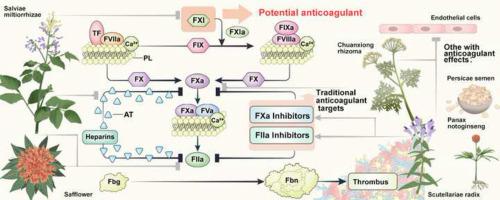Phytomedicine ( IF 7.9 ) Pub Date : 2023-05-20 , DOI: 10.1016/j.phymed.2023.154880 Qinan Yin 1 , Xiaoqin Zhang 2 , Suqing Liao 2 , Xiaobo Huang 2 , Chunpeng Craig Wan 3 , Yi Wang 2

|
Background
Anticoagulants are the main drugs used for the prevention and treatment of thrombosis. Currently, anticoagulant drugs are primarily multitarget heparin drugs, single-target FXa inhibitors and FIIa inhibitors. In addition, some traditional Chinese drugs also have anticoagulant effects, but they are not the main direction of treatment at present. But the anticoagulant drugs mentioned above, all have a common side effect is bleeding. Many other anticoagulation targets are under investigation. With further exploration of coagulation mechanism, how to further determine new anticoagulant targets and how to make traditional Chinese medicine play anticoagulant role have become a new field of exploration.
Purpose
The purpose of the study was to summarize the recent research progress on coagulation mechanisms, new anticoagulant targets and traditional Chinese medicine.
Methods
A comprehensive literature search was conducted using four electronic databases, including PubMed, Embase, CNKI, Wanfang database and ClinicalTrials.gov, from the inception of the study to 28 Feb 2023. Key words used in the literature search were “anticoagulation”, “anticoagulant targets”, “new targets”, “coagulation mechanisms”, “potential anticoagulant”, “herb medicine”, “botanical medicine”, “Chinese medicine”, “traditional Chinese medicine”, “blood coagulation factor”, keywords are linked with AND/OR. Recent findings on coagulation mechanisms, potential anticoagulant targets and traditional Chinese medicine were studied.
Results
The active components extracted from the Chinese medicinal herbs, Salvia miltiorrhiza, Chuanxiong rhizoma, safflower and Panax notoginseng have obvious anticoagulant effects and can be used as potential anticoagulant drugs, but the risk of bleeding is unclear. TF/FVIIa, FVIII, FIX, FXI, FXII, and FXIII have all been evaluated as targets in animal studies or clinical trials. FIX and FXI are the most studied anticoagulant targets, but FXI inhibitors have shown stronger advantages.
Conclusion
This review of potential anticoagulants provides a comprehensive resource. Literature analysis suggests that FXI inhibitors can be used as potential anticoagulant candidates. In addition, we should not ignore the anticoagulant effect of traditional Chinese medicine, and look forward to more research and the emergence of new drugs.
中文翻译:

潜在中药抗凝剂及抗凝药物新靶点
背景
抗凝剂是预防和治疗血栓形成的主要药物。目前,抗凝药物主要是多靶点肝素类药物、单靶点FXa抑制剂和FIIa抑制剂。此外,一些中药也有抗凝作用,但不是目前的主要治疗方向。但是上面提到的抗凝药物,都有一个共同的副作用就是出血。许多其他抗凝目标正在研究中。随着对凝血机制的进一步探索,如何进一步确定新的抗凝靶点,如何使中药发挥抗凝作用成为新的探索领域。
目的
本研究旨在总结近期在凝血机制、抗凝新靶点和中药方面的研究进展。
方法
从研究开始到 2023 年 2 月 28 日,使用 PubMed、Embase、CNKI、万方数据库和 ClinicalTrials.gov 四个电子数据库进行了全面的文献检索。文献检索中使用的关键词是“anticoagulation”、“anticoagulant”目标”,“新目标”,“凝血机制”,“潜在抗凝剂”,“草药”,“植物药”,“中药”,“中药”,“凝血因子”,关键词用AND链接/或者。研究了关于凝血机制、潜在抗凝靶点和中药的最新发现。
结果
从中药丹参、川芎、红花和三七中提取的活性成分具有明显的抗凝作用,可作为潜在的抗凝药物,但出血风险尚不清楚。TF/FVIIa、FVIII、FIX、FXI、FXII 和 FXIII 都已在动物研究或临床试验中作为靶标进行评估。FIX和FXI是研究最多的抗凝靶点,但FXI抑制剂显示出更强的优势。
结论
这篇对潜在抗凝剂的综述提供了全面的资源。文献分析表明,FXI 抑制剂可作为潜在的抗凝候选药物。此外,我们也不能忽视中药的抗凝作用,期待更多的研究和新药的出现。



























 京公网安备 11010802027423号
京公网安备 11010802027423号